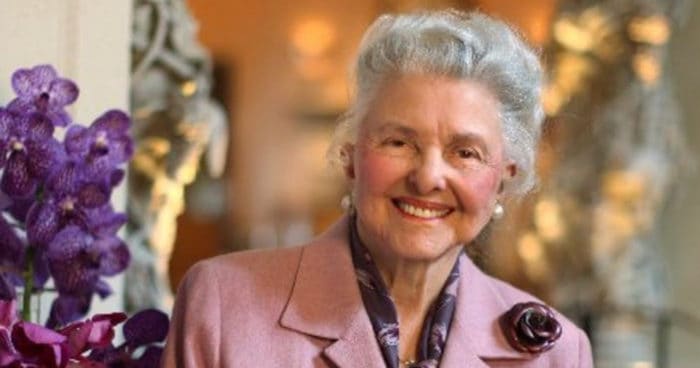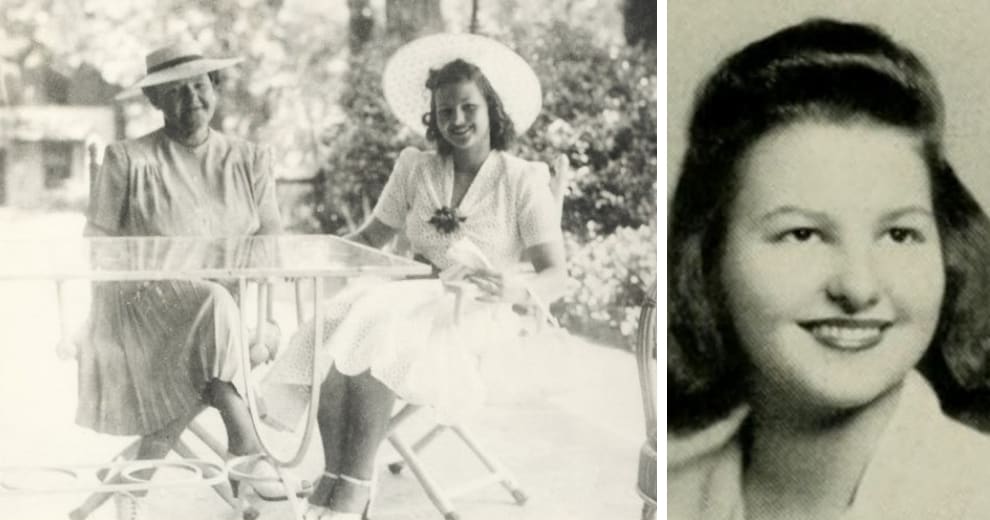Mary Baldwin University celebrates the life of Caroline Rose Hunt ’43, a dedicated supporter of the university, active philanthropist, keen businesswoman, and grande dame of Dallas, Texas. Hunt died Nov. 13, 2018, at 95 years old.

Hunt’s association with Mary Baldwin dates back to the days of the seminary when her great-grandmother, Nancy A. Purvis Hunnicutt, attended. Hunt went to Mary Baldwin during her freshman and sophomore years, finishing her bachelor of arts degree in English and art history at the University of Texas in 1943.
That connection blossomed into generous support over the years, most iconically in the creation of Lyda B. Hunt Dining Hall, the centerpiece of Mary Baldwin’s Staunton campus. In the late 1950s, Hunt and her sister, Margaret Hunt Hill ’39, provided the funding and vision for Hunt Dining Hall and named it for their mother.
“Caroline Hunt’s devotion to Mary Baldwin never faltered,” said President Pamela R. Fox. “She shared with me how much she valued her two years at Mary Baldwin, the special bond it created with her sister, Margaret, and also with Margaret’s granddaughter Heather Hill Washburne, who graduated from Mary Baldwin in 1994.”
Caroline and Margaret Hunt both enthusiastically served on the Board of Trustees, as did Washburne for a short period. The sisters began hosting the President’s Council annual gathering in Dallas in the 1980s, a tradition that continued through the last luncheon Hunt hosted in September 2017. Held at the Crescent Club atop the Crescent Hotel in Dallas, these luncheons were brain trusts for discussing the present and future of Mary Baldwin. In 2017 Dallas alumnae joined members of the current Board of Trustees, donor and leader Bertie Deming Smith ’46, and former Board chairs Yum Arnold and Anna Kate Hipp in a moving discussion.
“I asked Caroline during my last visit with her in March 2018 what she considered to be her most lasting contribution to Mary Baldwin,” Fox said. “Her answer came readily. She said, ‘when Margaret and I made possible the purchase of the Staunton Military Academy campus.’ Truly at that point in time, a difficult one for Mary Baldwin to be sure, the audacious move to significantly increase the size of our campus was a true turning point to our ongoing success.”
Hunt also created a named professorship, the Caroline Rose Hunt Distinguished Chair in the Natural Sciences, currently held by Professor of Biology Paul Deeble. She also helped create the Bailey Scholars program to support academically gifted students with a special scholarship.
MBU presented Hunt with an honorary doctorate in 1989, and with the university’s highest honor, the Algernon Sydney Sullivan Award, at Commencement 2006, recognizing her decades of support, her community service, and her integrity.
“I feel very privileged to have experienced her generous but very modest spirit for the past 15 years,” said Fox.

Caroline Rose Hunt with her mother, Lyda, in 1939 (left, photo credit: Dallas News). Hunt’s sophomore portrait at Mary Baldwin in 1941 (right).
Born in 1923, Hunt was one of five siblings, and her father, H.L. Hunt, discovered a massive oilfield in East Texas and once held the title of world’s richest man. (The character of J.R. Ewing in the TV show Dallas was inspired by him.) Working up from her first job in the mailroom of Hunt Oil, Hunt carved out her own entrepreneurial legacy with her company Rosewood Corp. As a real estate mogul, developer, and hotelier, Hunt made a significant mark on Dallas, her home of more than 50 years. She was inducted into the Texas Business Hall of Fame in 1999.
Devoted to her family, Hunt was mother of five, grandmother of 19, and great-grandmother of 23. She also mobilized her resources, time, and skill for the good of her community. The many organizations she supported included Dallas CASA, the United Way of Metropolitan Dallas, the Retina Foundation of the Southwest, the Junior League of Dallas, the Crystal Charity Ball, and the Dallas Arboretum. In 2013, the United Way presented Hunt with its greatest honor, the J. Erik Jonsson Award, for her volunteer work, which dated back to World War II when she went door-to-door collecting donations in her neighborhood.